Baby Foods to help with constipation
Are you a new parent worrying about your baby’s poop?
Parenting is a surprising journey, and one of the surprising elements includes a poop worry. The first year can be extremely harsh when you are new to parenting and don’t understand why the change your baby is going through. And, here you are, convinced that your baby is constipated.
Our tiny tots have a lot of things going inside them, along with bowel movements. Sometimes it is a common sight for babies to go a few days or a week without having any bowel movement.
You need not worry much but still need to be careful that your child might be suffering from constipation and needs help.
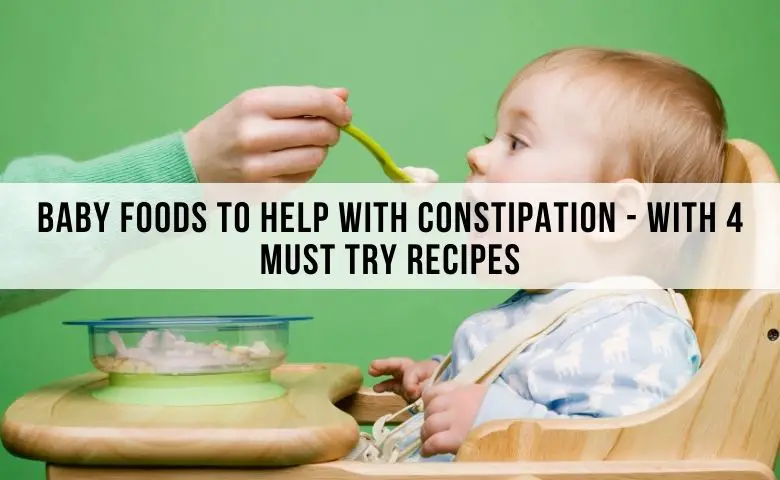
In case your baby is suffering from constipation, the baby might feel irritated. You might see your baby go uneasy even in a travel stroller. On learning that the child is suffering from constipation, many new parents rush to a paediatrician.
Sometimes the paediatrician is likely to give an idea to make use as home remedies as the first take of treating constipation in tiny babies.
Also, if you don’t go to a doctor and have elders at home, they’ll quickly recognize when the baby is suffering from constipation and suggest
Baby foods that will help with constipation.
So, before discussing the food options for babies suffering from constipation, here are the signs that will help you understand that your baby is suffering from constipation.
Signs of constipation in babies
Usually, babies can go days without bowel movements and feeling perfectly fine. So, guesswork for constipation in babies is quite tricky.
However, if you have doubts that your baby has constipation, look for some signs like those stated below:
- Infrequency in stools that are consistently very hard, causing trouble to the baby
- Clay and lousy stool consultancy for the baby
- Crying of the baby while eating
- Appetite loss
- Hard pellets of the stool as waste
- Long straining periods
- Signs of crying when the baby is trying and pushing hard to have a bowel movement
- Streaks and marks of blood in stool
- Hard and tight belly
Constipation is likely to happen when your baby grows and reaches the age where they are introduced to new food items. It increases when you switch from breastfeeding or formula-feeding to cow milk.
All the babies do not have all the signs of constipation. These constipation signs might vary with age or diet. Once the baby attains the age of consuming solid food, they begin to experience solid bowel movements.
However, make sure that you are not going too hard on feeding the baby and opting for soft food items only. You can opt for some food items like bananas, pulse water, etc. Make sure you are feeding the baby food with a consistency similar to that of peanut butter. A little looser would also work.
Baby’s stool timeline
The most common indication for a baby suffering from constipation is that the child has hard stools every time before consuming solid food items.
Initially, mothers breastfeed their baby, and they might pass stools. It’s because breastmilk is pretty easy to digest for babies.
When the baby reaches between 3-6 weeks of age, they may begin passing a large or soft stool. This movement might either occur once a week or maybe less than that too. It is not worrisome.
Some parents might skip breastfeeding and opt for formula feeding. In such a case, the stool movement is relatively more frequent and regular. These babies tend to have bowel movements either every day or every alternate day.
Also, formula-fed babies can have long breaks in between their bowel movements and still not have constipation.
Normal Stool and Bowel Patterns
Breastfed babies should not have hard, dry stools. The breast milk creates a perfect balance of water and fat while the baby’s natural stomach acid breaks down any consumed food particles into tiny pieces that are easy to digest–just like applesauce!
Breastfeeding also helps establish healthy gut bacteria which is crucial for normal bowel movements every day or after each feeding.
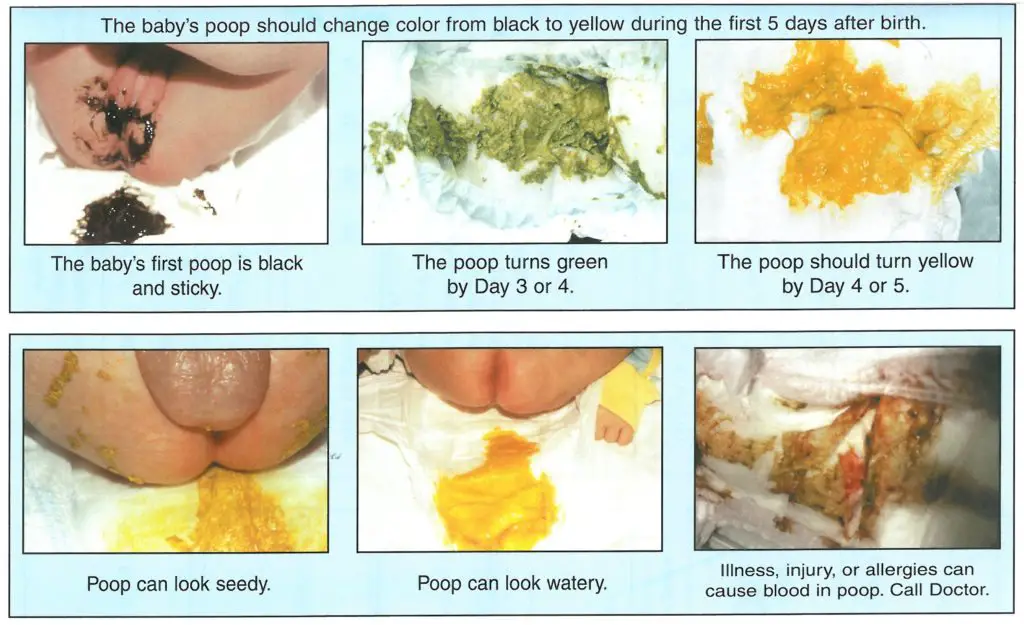
A baby who’s been raised on formula might have a totally different bowel movement than one that was breastfed. A typical runny stool for the latter is called “meconium” and you’ll know it when you see it because of its black color.
On top of this, your little cherub will poop every day or so – sometimes 1 to 3 times per day! This means they’re running like clockwork with their bowels which usually gets them out in about 2-3 days if not sooner (though there are exceptions).
These are all signs of healthy working bowels. If symptoms are less frequent, then they may be experiencing constipation.
Causes of constipation
Here are some changes that might cause constipation in babies.
Change in food type
Your baby is on a liquid diet for the initial six months, and once it is introduced to intake of solid food items, constipation is quite common.
They are just having milk or similar liquids in the initial six months of their age and gradually shift to other food items that are relatively solid.
Everybody is naturally equipped to react to anything new to it. The same is the case for babies. They, as well as, their babies need time to adapt to this significant change.
Introduction to new fluids
Introduction to solid food items means that there might be a decrease in the intake of liquids and essential fluids for the baby.
This results in a harder baby poop that will be difficult for the baby to push out of the body. In any case, a necessary and appropriate amount of fluids and liquids are essential for the digestion of solid food items in the body.
The child tends to have fewer fluids once the baby begins teething or does not feel well.
Lack of fibre intake
Babies are miniature versions of well-grown-up humans, after all. Their stomach is bound to work like an average human, irrespective of their tiny size. Milk does not have that much fibre quantum, which other solid foods tend to have.
Fibre is a vital component of a balanced diet and is beneficial for babies. Their little tummies need some time to adjust to the new thing. Hence, they might have constipation.
Here is how you can get your child to eat healthy meals!
Baby foods to help with constipation
Once you know that your baby is constipated, causing him to feel irritated and cranky even in their favorite reclining jogging stroller, it’s time to turn to your grandmother’s traditions. Here are some baby foods to help with constipation.
Basic mashes
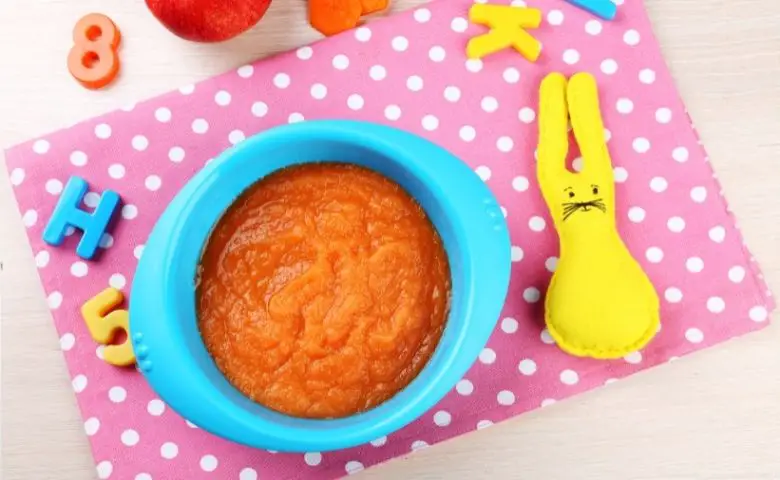
So, if your baby has constipation, it needs something easy to eat and easier to digest. Give them an apple mash, an avocado mash, or you can also try sweet potato puree.
These got soft on the delicate baby’s stomach and help them get back on track.
The B vegetable family
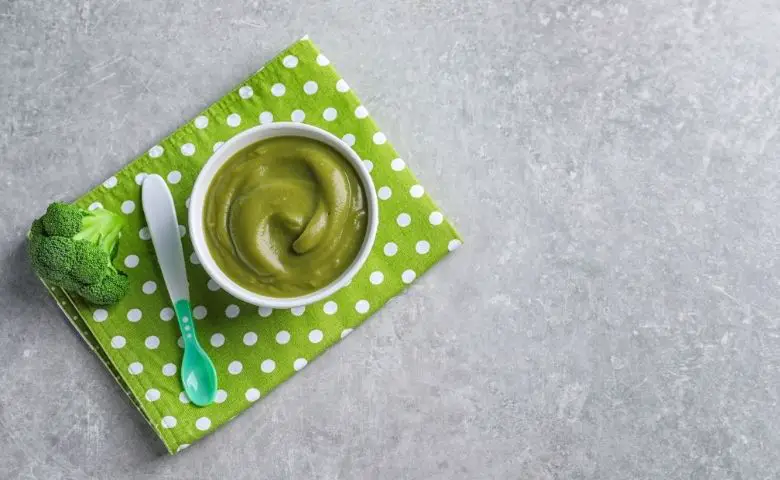
Think of all those vegetables beginning from the letter B and, you are almost there. Let us help you out. The three main B’s that are going to help you and your baby in treating constipation is beans, broccoli, as well as brussels sprouts.
You can make a quick soupy mixture of any of these and try feeding the baby with these.
Fruits
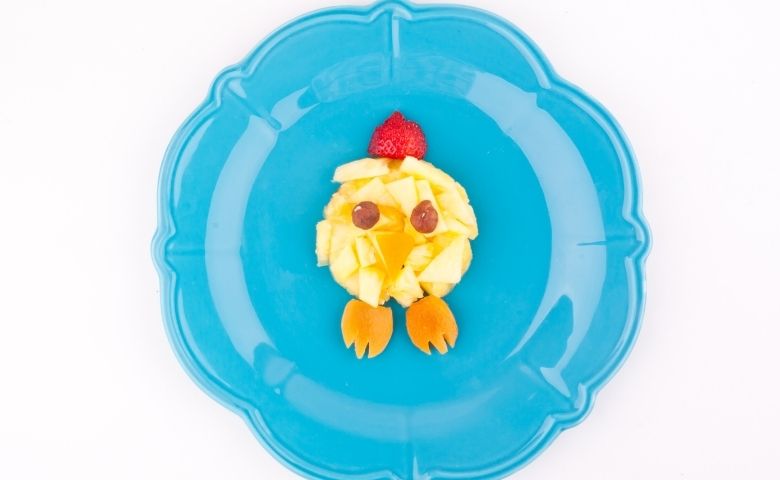
Another letter from the alphabet to help you treat your baby’s constipation is the letter P, and, undoubtedly, you have been getting this suggestion from your grandmother too.
Make a soupy mixture or puree, properly mixing all those pears, peaches, and plums. They are going to spell their magic and help your baby. To go a little on the creative side, try adding dates to this mixture, too.
Maintaining water levels

Sometimes it becomes a bit challenging to keep a check on the water intake. But, to help your baby with constipation, it is crucial. If you have a child that is six months old or more, try and add small amounts of water to diet. It helps in smoothing the process of digestion as well.
Fibre intake
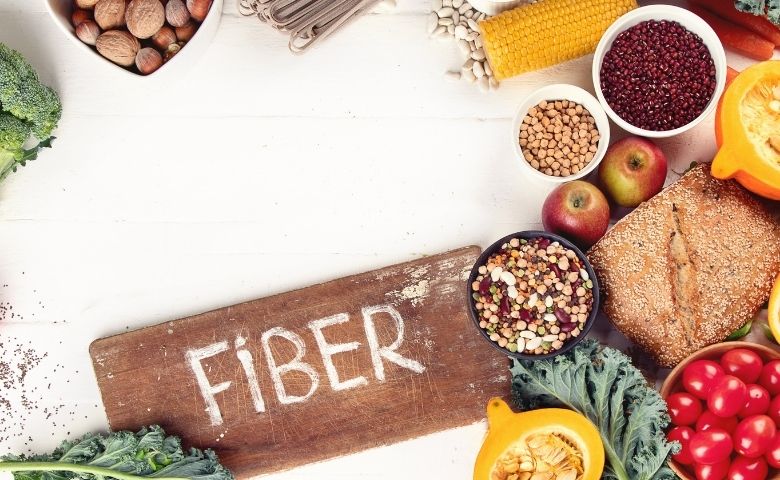
Fibre is essential for a child and its journey while transforming into an adult. Once your child has attained an age of 8 months, try feeding them with whole grains with good fibre content like brown rice, oatmeal, whole-wheat pasta, and cereals rich in fibre.
Once the child begins to develop and grow, the fibre becomes important. And for a well-grown human, water and roughage are essential parts of a balanced diet.
Must-try recipes
As a new parent, you’ll always want to go for trusted sources and food quality to feed your child. Hence, here are some delicious options that you should try for sure and then choose the one that your baby likes the most.
So, here you go!
Spinach and apple mixture
So, what you need to do is chop either one or two apples in the smallest size and heat them in a pan having half a cup of water. Then they turn brownish and tender, and almost one cup of spinach in the same and continue cooking for 1-2 minutes.
Once the soupy mixture is prepared, let it cool and then feed your baby. To add to the taste, you can opt for adding cinnamon or ginger. That’s your choice and your baby’s liking.
A smoothie mixture of sweet potatoes, apples, and peaches
So, to prepare this personal favorite, what you need to do is take a half sweet potato and cut it along with one apple and half a peach. Make sure you are cutting them into small pieces only.
Make use of a steamer basket to cook them and once they turn tender, use a blender to turn it into a smooth paste and feed your baby.
The P fruits served with cinnamon sprinkles
Take one plum and peach each to cut into small pieces. Ensure that the size of these pieces is not very big as it might have an issue while blending.
Use a saucepan and place these pieces on it along with half a cup of water of any similar quantity. The presence of water will help the mixture to get softer as it is being cooked. Add a little cinnamon and then blend it before feeding your baby.
Juices
As new parents, you’ll have thousands of suggestions pouring in to help you and your baby treat constipation. One of these suggestions is to feed the baby with juices.
But, the American Academy of Pediatrics has a recommendation of steer clearing of the fruit juices for children that are below the age of 1 year.
Hence, you can consider opting for these juices in the form of purees and pastes for having similar benefits for your child’s health and easing constipation. Prune juices have a high level of sorbitol, as well as phenolic substances.
Also, the dried plums perform an excellent function having all the diuretic as well as laxative properties. Hence, if you have more than one year of age, try feeding the child with prune juice but in small amounts.
This will help in the good functioning of their system.
What else to do to help with constipation?
As a new parent, you would want to try everything to get your baby some relief. Here are some simple things you can try apart from the foods that help constipated baby:
- Giving a warm bath can help relax the baby’s abdominal muscles.
- Get your baby on their back and help them ride an imaginary cycle with legs. Also, hold their feet and knees together and push them gently towards their stomach.
- Give your baby a good massage in clockwise circles on your baby’s stomach using your fingers.
- Fridababy Windi – While this is marketed as a remedy for gas, the stimulation will often help a baby to poop! (You may get a few farts out of it too.)
Wrapping up
Don’t worry if your baby has constipation. The baby goes through several changes in the first year.
Try and combine different food flavors that will help resolve constipation issues. While dealing with your baby’s poop issue can be pretty intimidating in the beginning, you’ll get used to it.
You’ll soon find yourself discussing remedies with other parents over lunch or coffee. After all, parenthood is not a destination but a journey to be discovered.
Happy Pooping! 😀
Here are some of our favorites mom and kids products that we have curated just for you to have a look!
Related Articles:
8 Best Baby Sleep Tips And Tricks That Really Work For New Moms
How To Make Your Child Listen Without Yelling
11 Effective Tips To Reverse Defiance In Kids
9 Incredible Habits For Raising Smart Kids
How To Get Your Toddler To Eat Healthy Meals
Don’t Forget to Pin it for Later!
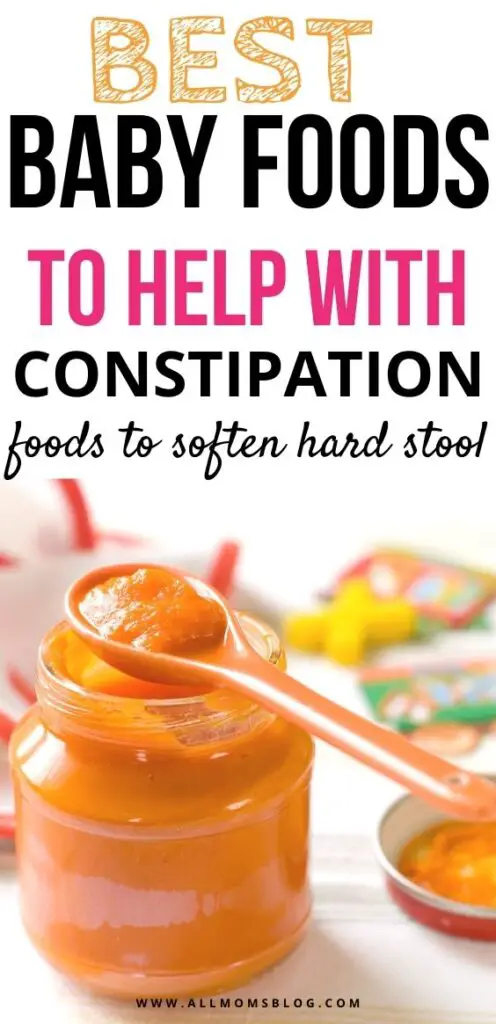
Baby Foods to help with constipation
Disclaimer: This content is for informational purposes only and is not intended as a substitute for professional medical advice, diagnosis, or treatment. Always consult your healthcare provider with any questions you may have regarding a medical condition. Our blog posts contain affiliate links. These don’t cost you anything extra, but they allow us to continue running this site and providing free content for our readers. Please read my full disclosure here.

Israr Ahmed
I am a professional digital marketer and a father of an 11-month-old baby girl. I live in New Delhi, India.

such an informative and amazing article. it gives a lot of practical tips. will definitely share the article.
Thank you! I’m glad you found the post helpful.
Very helpful article. I have a toddler and often face lots of problems when she eats some food. Therefore, got to read this at the right time. Thanks for sharing!
Hi Zippy,
Glad you found the post helpful.